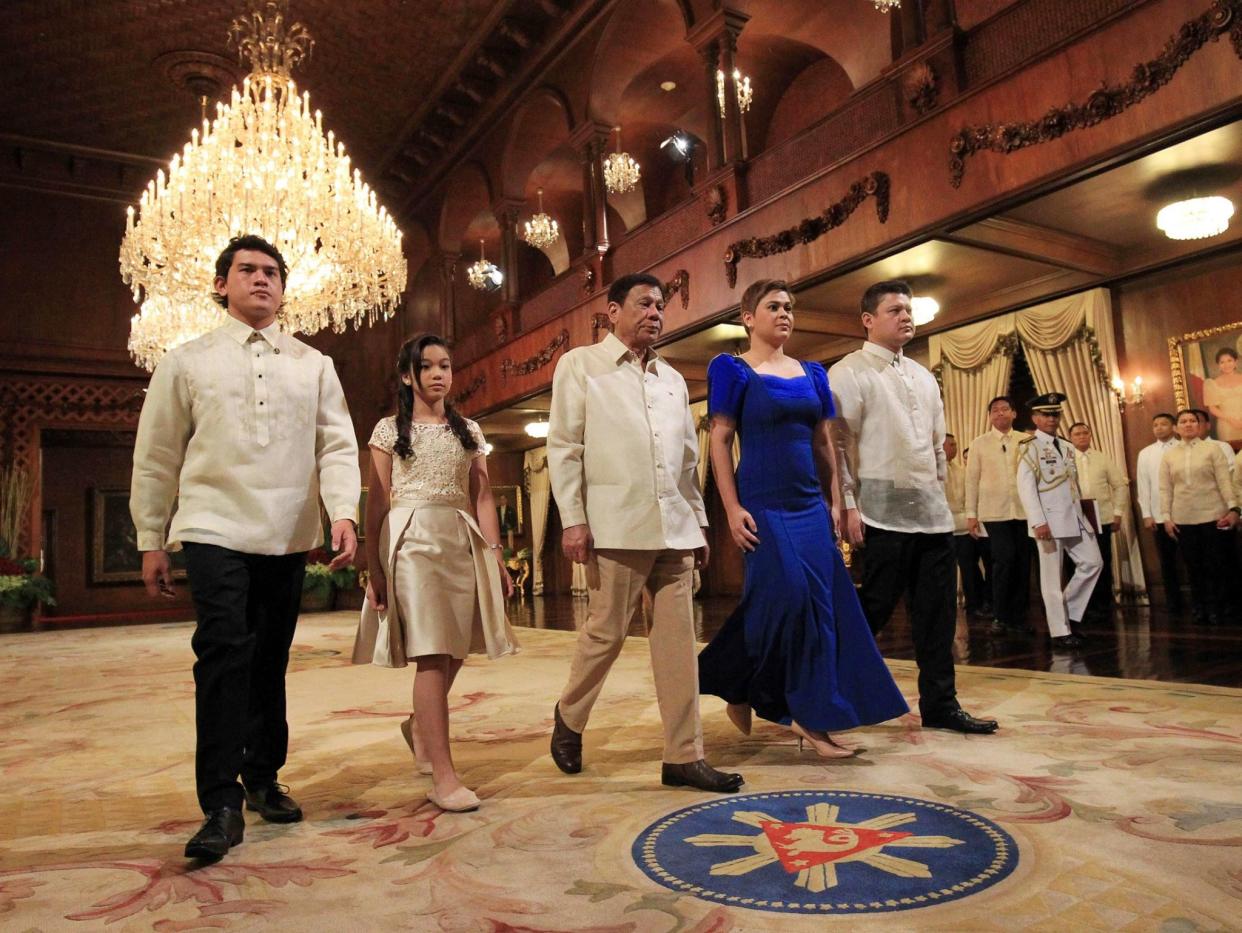What to Know About the Dutertes’ Plan to Win Back the Philippines

Pictured in 2016, President Rodrigo Duterte (center) walks with his children (left to right) Sebastian, Veronica, Sara, and Paolo, in Manila. <br> Credit - Malacañang Palace
Elections in the Philippines may be a year away, but the politicking has already begun, with one particular family keen to take up as many posts as possible.
When Rodrigo Duterte handed over the presidency to Ferdinand “Bongbong” Marcos Jr. in 2022, he embraced the son of the country’s former dictator as a vehicle for extending his own legacy. Duterte’s daughter, Sara Duterte-Carpio, joined Marcos Jr.’s ticket and was elected Vice President.
The alliance, however, between two controversial yet powerful Philippine political dynasties, which was shaky from the start, has since frayed as Duterte-Carpio’s ambitions for the highest office continue to grow more apparent.
But it’s not just Duterte-Carpio who is gunning to govern. This week she confirmed to local media that her father and two brothers are all planning to run for Senate in May 2025.
“All of them are raring to run,” she said Tuesday, referring to the former President, Congressman Paolo Duterte, and Davao City Mayor Sebastian Duterte. Duterte-Carpio added that her mother has advised her to run for mayor of Davao City, the post currently held by her brother Sebastian, previously held by Duterte-Carpio from 2016 to 2022, and before that by her father for more than 20 years across three separate stints until he became President in 2016. Duterte-Carpio also said Sebastian will run for the presidency in 2028, though many believe that she is setting herself up for the same bid.
The surprise revelation of the Dutertes’ political plans comes just days after Duterte-Carpio stepped down from her position as Education Secretary last week (while remaining Vice President)—a move widely perceived to be in preparation for a run for the presidency in 2028.
Democracies around the world are no stranger to dynasties—from the Kennedys and Bushes of the U.S. to the Nehru-Gandhis of India—but the Philippines stands out for how pervasive a handful of families are across local and national government, despite “political dynasties” being technically prohibited by the country’s constitution. Still, should the three male Dutertes succeed in being elected to the 24-member Philippine upper legislative chamber next year, it would represent one of the country’s biggest power grabs in recent history.
As Marcos Jr.’s approval ratings have fluctuated—taking a hit as inflation spiked last year—the Dutertes, particularly former President Rodrigo Duterte, have spent months rallying against Marcos Jr.’s government, which has charted a markedly different path than Duterte’s, especially on relations with China and the U.S. as Marcos Jr. edges closer to conflict with a hostile Beijing that Duterte largely deferred to.
Duterte has accused Marcos Jr. of being a drug user and plotting to hold onto power despite the Philippines’ one-term limit for Presidents.
And the mounting challenge to Marcos Jr. and his allies in government is not necessarily an empty threat. Domestically, the Trump-like Duterte left office as one of the most popular leaders in Southeast Asia, as much of the public revered his hardline approach to crime and perceived relatability to the common person—despite international criticisms of a brutal drug war that extrajudicially killed tens of thousands, his quelling of opposition figures, and a controversial admission of sexual assault. (Conveniently for Duterte, his family getting a greater foothold in Congress could help hinder probes into his alleged wrongdoing.)
Yet, there remain reasons for skepticism. The candidacies of the three Dutertes aren’t official as filing doesn’t take place until October, by when they may have changed plans given the historic volatility the family has evinced when it comes to political maneuvering. Former President Duterte, for example, had filed his candidacy for Senate in 2022, only to withdraw his bid in December 2021.
For Richard Heydarian, a Manila-based geopolitical analyst who wrote The Rise of Duterte: A Populist Revolt Against Elite Democracy, Duterte-Carpio’s announcement this week is less an outline of specific plans and more an assertion of the family’s desire to remain important. “This is kind of a desperate move, because they can see that the sharks are smelling blood, that the Dutertes are marginalized,” he tells TIME. “She wants to remind everyone that the Dutertes are still a force to reckon with.”
Contact us at letters@time.com.


